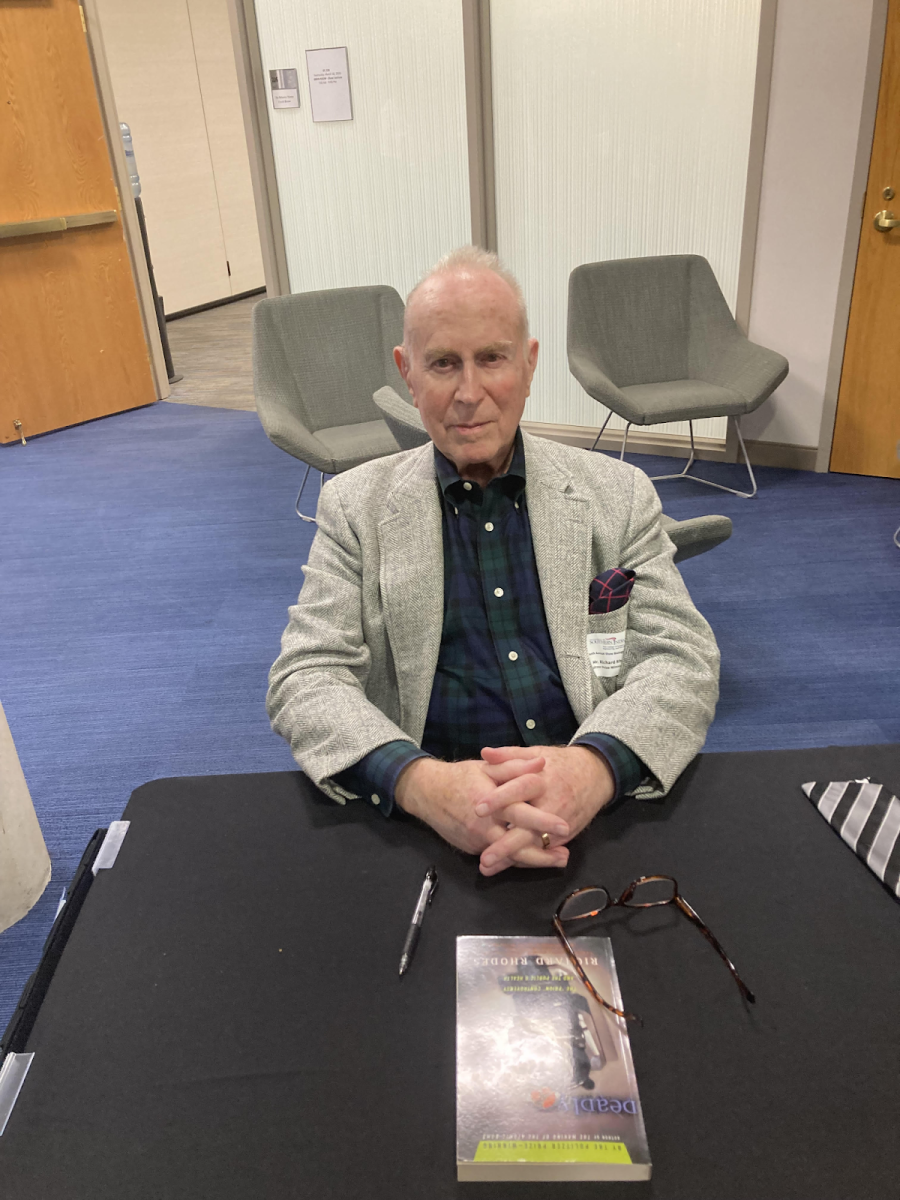On March 26, USI held its annual Shaw Biology lecture in Carter Hall. The guest speaker this year was Richard Rhodes, Pulitzer Prize-winning author of The Making of the Atomic Bomb. His lecture was about Robert Oppenheimer’s work to create the atomic bomb and the effects of nuclear weapons that remain controversial to this day.
Richard Rhodes is a Pulitzer Prize-winning author of fifteen books. He has written three books surrounding the Manhattan Project and nuclear weapons, one of which, The Making of the Atomic Bomb, won him the Pulitzer Prize in nonfiction. During his lecture titled “Robert Oppenheimer: The Man, the Making of the Atomic Bomb and the Consequences,” he talked about much of the information in this book, including Oppenheimer, the atmosphere of the lab in which the bomb was made and the effects that the bomb has had on war and diplomacy.
During the lecture, Rhodes noted that eighty years ago, the United States dropped the first atomic bomb on Hiroshima, Japan. The bomb was the result of a three-year-long race to beat the Third Reich to atomic weapons.
“The decision to make the bomb seems forgone,” Rhodes says, “How could we possibly allow Nazi Germany to get a bomb before we had?”
Records exist that indicate Oppenheimer was working on the idea of the atomic bomb as early as 1941. In the fall of 1942, Oppenheimer was appointed as the head of the Los Alamos Laboratory, whose purpose was to make atomic bombs under the Manhattan Project.
Rhodes described Oppenheimer as an inquisitive intellectual who held many interests. He says that one of his interviewees recounted, “Oppenheimer wanted every experience … I never ran into anyone who was brighter than he was.”
The making of the bomb culminated in the bombings of Hiroshima and Nagasaki. In Hiroshima alone, 237,000 people died directly from the bomb, and its lingering effects would increase the death count by at least 90,000 people.
The scientists of the Los Alamos research center, where the bomb had been developed, quickly realized the enormous ramifications that the weapon they had created posed for the waging of wars.
Rhodes says, “Knowledge of how to release nuclear energy [was] new knowledge of the natural world to which the human world [had] no choice but to adapt or be destroyed.”
Oppenheimer and many of his colleagues began to push for regulation and destruction of the weapons they had created. Their efforts resulted in the Acheson-Lilienthal Report.
Rhodes says it would “promote the utilization of atomic energy for peaceful and humanitarian means.”
As history has shown, this attempt to keep nuclear power away from war ultimately failed. The threat of nuclear apocalypse was ever-present as the Cold War took place over the latter half of the twentieth century.
The motives and reasoning behind the invention and use of the atomic bomb have come under heavy questioning and debate over recent years. When the bomb was first dropped, it was first rationalized as a way to prevent the further loss of American life by invading the Japanese homeland.
Describing his experience during World War II, Rhodes says, “I remember as an eight year old boy, we were so sick of the war, so sick of death and so sick of rationing. It was time for it to be over … whether we should have been bombing civilians is another issue.”
Later historians would argue that the dropping of the bomb had been a show of strength to frighten Stalin and Soviet Russia out of any imperialistic aims. Some even argue that Japan was already teetering on the edge of surrender. They say that the bomb was not needed at all and that American generals were too hasty in their decisions.
It should be noted that events in history are rarely ever the result of one singular motive or reason and instead are influenced by a tapestry of conflicting natural and societal pressures. All of the theories surrounding the atomic bomb hold some grain of truth in them.
Richard Rhodes, quoting Oppenheimer’s speech to the people of Los Alamos before they disbanded, says, “One always has to worry what people say of their motives is not adequate. Many people said many different things, and most of them had some validity.”



